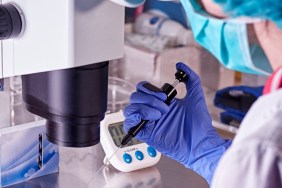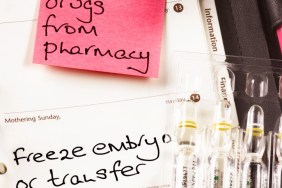Thanks to celebrities like Lena Dunham endometriosis has entered the common vernacular – and it’s about time! Researches estimate some 11% of women suffer from this disorder.
What exactly is endometriosis?
“Endometriosis is defined as the presence of endometrial cells (those that line the uterus and respond to hormonal fluctuations) outside of the uterus (in the peritoneal cavity, on the ovaries, bowel and other places),” says Dr. Barry Witt, the medical director at WINFertility. “The presence of these cells may result in inflammation and scarring, which can result in symptoms or infertility.”
What are some clues that a woman might have endometriosis?
While there are common indicators that a woman might be dealing with the condition like painful periods (dysmenorrhea), painful intercourse (dyspareunia) and pelvic pain, some women will show no symptoms, which is referred to as ‘silent endometriosis.’ These women often only discover that they are suffering from the it when they see a reproductive specialist upon having trouble conceiving.
“However, some women will have significant dysmenorrhea or pelvic pain that in severe cases can be debilitating,” says Dr. Witt. “Menstrual periods may be very painful and require medications for pain relief and can result in missing work. Some women will require surgery or multiple surgeries to help control the pain. Intercourse may be difficult due to significant dyspareunia.”
A definitive diagnosis of the condition can only be made by a surgical procedure (laparoscopy) to directly visualize the endometriosis and in some cases by obtaining a biopsy to confirm that the lesions seen represent endometriosis. “Laparoscopy may be recommended for women with significant symptoms of endometriosis in order to not only diagnose the disorder, but to also surgically treat it,” says Dr. Witt. “It’s not usually necessary to perform a laparoscopy in asymptomatic women with infertility just to make the definitive diagnosis because the type of treatment for the infertility is usually the same whether there is mild endometriosis present or not. ”
Does endometriosis automatically mean a woman will need help conceiving?
How this disorder affects fertility is not always clear. “Some severe cases of endometriosis result in significant scarring around the ovaries and fallopian tubes that can either block the tubes or make it difficult for them to function normally,” says Dr. Witt. “It may be associated with poorer egg quality as well. Also, multiple surgeries for endometriosis can be associated with scarring and can affect the ovarian function.”
If a woman has endometriosis and is not currently symptomatic with pelvic pain, but isn’t conceiving naturally month after month, then an evaluation with a reproductive endocrinologist needs to be done to see if there are additional reasons for why the couple is not conceiving. “This should include a semen analysis to rule out a male factor and an X-ray of the fallopian tubes using contrast injected into the uterus through the cervix (called hysterosalpingogram or HSG) to confirm that the fallopian tubes are open and appear normal. Treatment of infertility in women with endometriosis may require in vitro fertilization (IVF) if the fallopian tubes are blocked or appear damaged on the HSG or if there is evidence for scarring (adhesions) around the tubes or ovaries.”
If the tubes appear normal and there’s a normal semen analysis, Dr. Witt says that the usual initial treatment of mild endometriosis-related infertility is a combination of IUI (intrauterine insemination, where sperm is washed and a high concentration of active sperm are injected into the uterus through the cervix with a catheter) and ovarian stimulation with clomiphene citrate, which stimulates the ovaries and sometimes makes a woman ovulate more than one egg. “This is similar treatment to what is given to couples with otherwise unexplained infertility. In cases of moderate to severe endometriosis, but with patent tubes, IUI with clomiphene citrate may still be attempted, but some doctors may recommend moving directly to IVF in those patients.”
What are chances of success with fertility treatments for women with endometriosis?
Fertility treatments are emotionally and often financially draining, so it’s only natural to wonder about the odds of success are before diving in head first. “Women with normal ovarian reserve should respond well to fertility treatments, but women with low ovarian reserve as a result of severe endometriosis or previous surgical treatment of their endometriosis may respond less well than other women their age,” says Dr. Witt. “This can result in fewer embryos that are available and lower chances for successful conception.”
There is a silver lining!
“Once pregnant, many women have a decrease in their symptoms as a result of the suppressive effect of the pregnancy hormones on endometriosis,” says Dr. Witt. “It’s rare for the condition to flare up in pregnancy or for an cyst to rupture or twist, which could require surgical treatment. There shouldn’t be any effect on birth, although if a cesarean section is needed, it may be more difficult if the endometriosis resulted in significant pelvic adhesions.”








